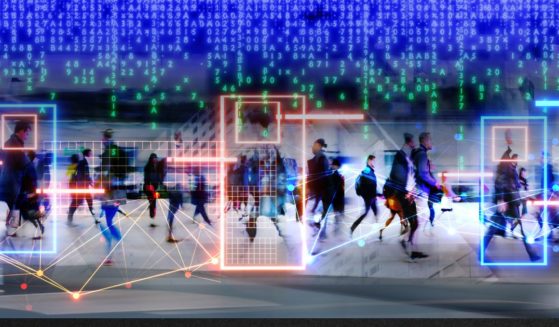Worldcoin CEO Crows Digital Currency, Digital ID Coming 'Whether You Like It or Not' Amid Increasing Global Mandates
Ready or not, it’s coming.
Worldcoin’s CEO has issued a stark warning that a worldwide digital ID system will be implemented “whether you like it or not.”
Worldcoin is “a company that wants billions of people to scan their irises to create a global system of authentication,” Breitbart reported.
Its co-founder Sam Altman — CEO of OpenAI, which brought us the alarming ChatGPT — has also made headlines for telling Forbes he hopes his artificial intelligence technology will “break capitalism,” according to the outlet.
Worldcoin has successfully developed what they refer to as “the world’s largest identity and financial public network,” according to the organization’s website.
Worldcoin CEO: Global Digital Currency Tied To Global Digital ID Will Soon Be Required ‘Whether You Like It Or Not’ https://t.co/Sl4cYdSicE
— The Gateway Pundit (@gatewaypundit) July 21, 2023
The core of this system involves linking digital cash, known as Central Bank Digital Currencies, with a comprehensive digital identity framework, according to Slay News.
The Worldcoin token, known as WLD, is the digital currency created by Worldcoin to facilitate financial transactions within their network. It operates similarly to traditional currencies, but in a digital format. This digital money is designed to be more efficient, enabling seamless global transactions.
World ID is another product introduced by Worldcoin. It serves as a digital identity platform, collecting and storing individual biometric data in a secure database. By linking this identity data to the Worldcoin token, the platform establishes a connection between a person’s financial transactions and their unique digital identity.
Both WLD and World ID are interlinked and accessible through Worldcoin’s dedicated application, the World App.
The World App, according to the organization’s website, serves as a comprehensive platform enabling global payments, purchases and transfers, accommodating both digital assets and traditional currencies.
Worldcoin employs advanced iris scanners, necessitating individuals to undergo eye scanning as a means of verifying their identity.
As an incentive for participation, individuals who willingly provide their biometric data will receive “small sums” in Worldcoin tokens when they sign up for the World ID program, Slay News reported.
Do these “tokens” look like 30 pieces of silver? One wonders.
Blania brushed aside concerns that the technology could be used to put people in what amounts to a digital prison, controlling their every move and purchase.
“Something like World ID will eventually exist, meaning that you will need to verify [you are human] on the internet, whether you like it or not,” he said in recent remarks, according to Breitbart.
In other words, your ability to buy a loaf of bread at the grocery store will be linked to your biometric data.
The global movement toward digital IDs, which had largely stalled, was given momentum by the COVID-19 crisis, the Liberty Sentinel reported.
Less prosperous nations have already succumbed to the allure of this new type of currency.
Brazil’s central bank is gearing up to introduce the digital real by the close of 2024, according to The Banker.com. In late May, the central bank unveiled a list of 14 selected financial institutions set to partake in the pilot phase of the new digital currency, which is currently under review by the institution.
Blockchain developer Pedro Magalhães claims that he has successfully reverse-engineered the source code of Brazil’s pilot central bank digital currency (CBDC).
He revealed the existence of functions that empower a central authority to freeze funds or reduce balances. pic.twitter.com/J34wgBJW5o
— Wall Street Silver (@WallStreetSilv) July 13, 2023
Ethiopia is also on track to make digital ID mandatory, in large part because the United Nations plans to use biometric checkpoints at food distribution centers.
An op-ed piece published in April in the Addis Standard described the move to digital in a post titled, “Change is coming to Ethiopian banking.”
Utilizing a World Bank-supported project, the country aims to enroll all eligible citizens into the digital ID system by 2025. The major banks in Ethiopia will play a key role in enforcing this transition, requiring citizens to possess a digital ID to access banking services and government benefits, according to Liberty Sentinel.
With digital IDs becoming a prerequisite for banking, health care and other services, the world inches closer to a completely digital economy.
According to Liberty Sentinel, the World Bank system is being hailed as the “gold standard” for a universally accepted digital identity, aligning with the predictions made by Klaus Schwab, the founder of the World Economic Forum, over three years ago.
Schwab had reportedly foreseen a future where every individual would possess a digital identity.
He called it the “Fourth Industrial Revolution,” which would “lead to a fusion of our physical, biological and digital identities.”
Digital identity systems, with the inclusion of near-perfect facial recognition technology, along with other identifiers like human gait, breath, iris scans, geolocators and other biometric data, are no longer the realm of dystopian science fiction. Entire nations are giving up their privacy and sovereignty for “tokens,” and more are bound to follow.
Moreover, the likelihood of artificial intelligence making decisions about our access to these countries’ digital identities gives rise to the strong probability that those who control the currency would also control morality.
Already there have been multiple instances of the AI ChatGPT showing a clear bias toward leftist principles, as reported by Brookings in May.
#16 ChatGPT ranks left-leaning news as the most credible and Russian state media and right-leaning news as the least credible. pic.twitter.com/LoObkD5Tom
— KanekoaTheGreat (@KanekoaTheGreat) February 21, 2023
The fact that ChatGPT founder Sam Altman is also the founder of the digital ID system WorldCoin does not make one feel any safer.
The predicted “Fourth Industrial Revolution,” sounds more like the fourth horseman of the Apocalypse.
Truth and Accuracy
We are committed to truth and accuracy in all of our journalism. Read our editorial standards.












